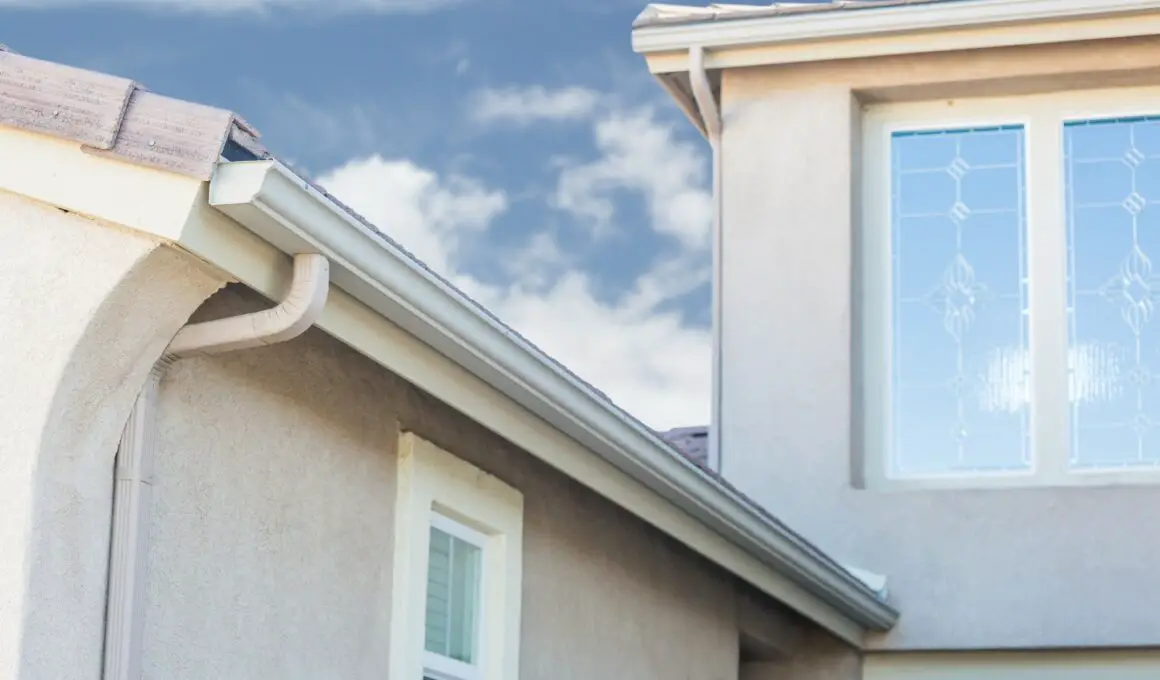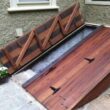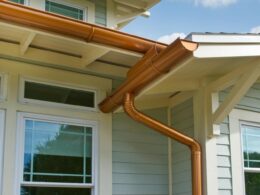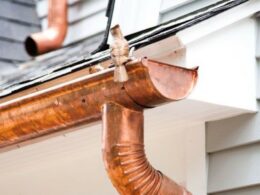Table of Contents Show
Gutters, those often overlooked components, are vital for protecting your home from water damage. In this article, we’re going to explore five different types of gutters, each with its unique features and benefits, tailored for various homes and preferences.
Gutters come in various shapes and materials, and choosing the right one for your home can be a game-changer in terms of both functionality and aesthetic appeal. Whether you’re building a new home, upgrading your existing gutter system, or simply curious about your options, understanding the different types of gutters is key.
Throughout my career, I’ve installed and repaired countless gutter systems, and I’ve seen firsthand how the right choice can prevent costly water damage and enhance a home’s exterior.
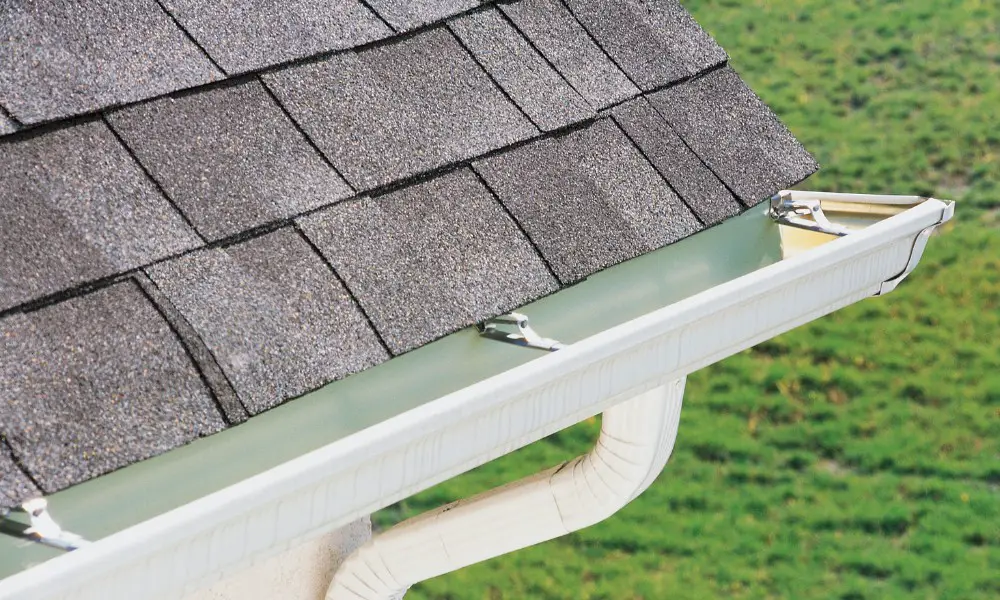
Types Of Gutter Suitable For Your Home
Type 1: K-Style Gutters
K-style gutters, recognizable by their decorative, crown molding-like appearance, are a popular choice among homeowners. They resemble the letter ‘K’ when viewed from the side, which gives them their name.
Commonly used materials for K-Style gutters include aluminum, which is lightweight and rust-resistant, and vinyl, known for its affordability and ease of installation. Other materials like copper and steel are also used for their durability and aesthetic appeal, though they come at a higher cost.
Benefits
- High Capacity: Their unique shape allows K-Style gutters to hold more water than rounded styles, making them especially effective in areas with heavy rainfall.
- Aesthetic Appeal: The decorative design of K-Style gutters complements the architecture of many homes, adding a refined touch to the exterior.
- Durability: These gutters are known for their strength and rigidity, particularly when made from aluminum or steel, reducing the likelihood of damage over time.
- Ease of Installation: The flat back of K-Style gutters allows them to be directly attached to the fascia board, making the installation process straightforward.
Type 2: Half-Round Gutters
Half-Round gutters are characterized by their simple, semi-circular design, reminiscent of historic and traditional architecture. This timeless style is often made from materials like copper, aluminum, and galvanized steel.
The smooth, curved shape is not just an aesthetic choice; it also has functional implications. These gutters are commonly found on older homes or those designed with a classical aesthetic in mind, but they’re also gaining popularity in modern constructions for their sleek, clean look.
Advantages
- Efficient Water Flow: The smooth, rounded design facilitates a more efficient water flow, reducing the likelihood of standing water and associated issues.
- Less Clogging: The shape allows debris to flow more freely compared to angular gutter types, leading to fewer clogs.
- Easy to Clean: Their open, accessible design makes them easier to clean and maintain than more complex gutter shapes.
- Aesthetic Versatility: Half-Round gutters can enhance both traditional and contemporary homes, offering a touch of elegance and classic charm.
Type 3: Seamless Gutters
Seamless gutters are exactly what their name suggests: gutters without seams. Unlike traditional gutter systems that are made from sections joined together, seamless gutters are crafted from one continuous piece of material, typically aluminum.
They are custom-made to fit the precise measurements of a home, created on-site using a special machine that extrudes metal into the desired gutter shape. This customization ensures a perfect fit and a sleek, uniform appearance along the roofline.
Pros
- Reduced Leaks: With no seams except at the corners and downspouts, there’s a lower risk of leaks, making them more efficient at water management.
- Low Maintenance: Seamless gutters are less prone to clogs and blockages from leaves and debris, thanks to the absence of seams, which reduces maintenance needs.
- Custom Fit: Each gutter system is tailor-made for the specific house, ensuring a perfect fit and a clean, streamlined look.
- Durability: Typically made from sturdy materials like aluminum, seamless gutters are durable and long-lasting.
Type 4: Fascia Gutters
Fascia gutters are a unique and streamlined gutter system, distinctively designed to serve dual purposes: gutter functionality and fascia board aesthetic.
These gutters are integrated with the fascia board of the house, creating a seamless and clean look on the roof’s edge. They are typically made from aluminum, a material known for its durability and resistance to rust.
Design Specifics
The primary characteristic of fascia gutters is that they are custom-built to fit directly onto the fascia board, essentially replacing it.
This design allows for a larger gutter capacity compared to standard types, which is particularly beneficial in areas with heavy rainfall. Their streamlined appearance is sleek and modern, blending in seamlessly with the home’s architecture.
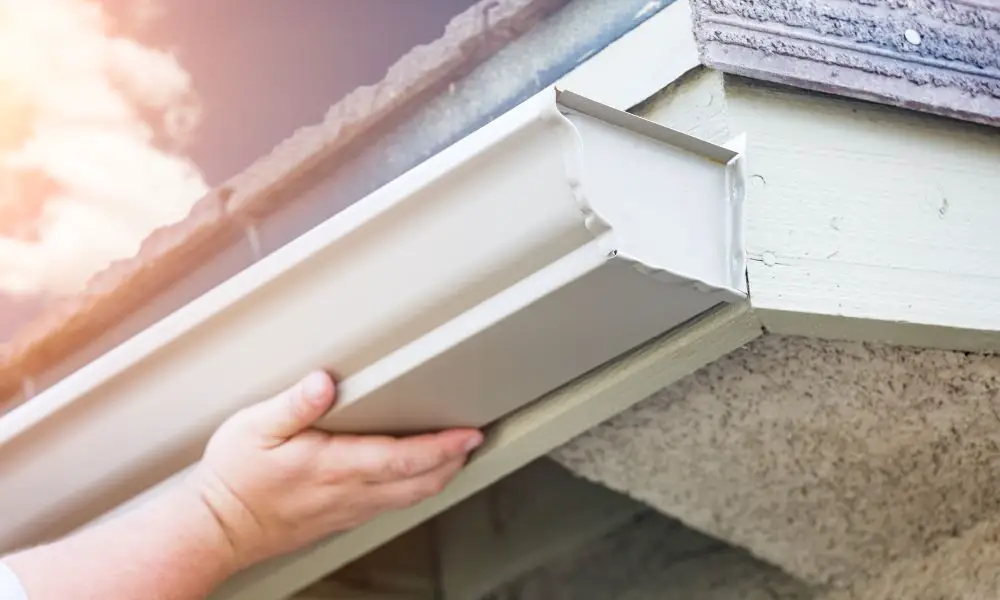
Type 5: Box Gutters
Box gutters, true to their name, have a box-like, rectangular structure and are typically used in commercial or industrial buildings. However, they are also found in some residential applications, especially in homes with flat roofs or unique architectural styles.
These gutters are usually larger than standard residential gutters and are designed to handle a higher volume of water. Common materials for box gutters include galvanized steel, aluminum, and sometimes copper for added durability and aesthetic appeal.
Benefits
- High Capacity: Box gutters can manage more significant volumes of water, making them suitable for large roofs or areas with heavy rainfall.
- Durability: Typically constructed from sturdy materials, these gutters are robust and long-lasting.
- Customizable: They can be custom fabricated to fit specific architectural needs, offering flexibility in design and installation.
Choosing the Right Type of Gutter for Your Home
When it comes to selecting the right gutters for your home, several key factors come into play. Your choice will impact not just the appearance of your home but also its long-term maintenance and functionality. Here’s a simple guide to help you navigate the process:
1. Climate Considerations
- Rainfall Intensity: In areas with heavy rainfall, larger capacity gutters like Box or K-Style may be more suitable.
- Snow and Ice: If you live in a region with harsh winters, durable materials, and gutter designs that can withstand the weight of snow and ice are crucial.
2. Home Style and Architecture
- Historic or Traditional Homes: Half-Round gutters often complement these styles, enhancing the aesthetic while providing necessary functionality.
- Modern Homes: Seamless or Fascia gutters can align well with the sleek lines and minimalistic design of contemporary architecture.
3. Budget Constraints
- Initial Costs vs. Long-Term Savings: While some gutter types may be more affordable upfront, consider their longevity and maintenance costs. Seamless gutters, for example, may cost more initially but save money in the long run due to lower maintenance needs.
- Material Costs: Materials like vinyl are generally more budget-friendly, whereas copper and steel are on the higher end of the price spectrum but offer durability and aesthetic appeal.
4. Maintenance and Upkeep
- Ease of Cleaning: Consider how easy the gutters are to maintain. For example, K-style gutters might require more frequent cleaning due to their shape.
- Repair and Replacement: Think about the ease of repairing or replacing parts of the gutter system. Seamless gutters might require more extensive work for repairs compared to sectional ones.
In summary, choosing the right gutters involves a careful consideration of your local climate, the architectural style of your home, your budget, and the maintenance aspects.






